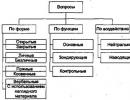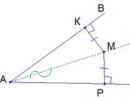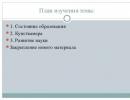What do you know about Nekrasov's childhood. Nikolai Nekrasov - Childhood: Verse. School life of Nikolai Nekrasov
The name of one of the brightest writers of the 19th century is familiar to everyone. Such works as “To whom it is good to live in Russia” and “Grandfather Mazai and hares” are part of school curriculum every modern student. Nekrasov's biography includes information known to all admirers of his work.
For example, he is considered not only a poet, but also a publicist. This is a revolutionary democrat, head and editor of the journals Otechestvennye Zapiski and Sovremennik. Lover of card games and hunting. Nekrasov's biography knows many others interesting facts. Our article is dedicated to them.
Who is he?
The native city of the future poet was Ukrainian Nemyriv, where he was born in 1821. Nekrasov Nikolai Alekseevich was born into the family of a military man and the well-bred daughter of a wealthy tenant. According to the poet's memoirs, the parents' marriage was not happy. The mother was always presented as a sufferer, experiencing her female lot. The writer devoted many works to her. Perhaps her image is the only positive hero of Nekrasov's world, which he will carry through all his work. The father will also become the prototype of individual heroes, but more despotic.

Growing up and becoming
After his father retired, Aleksey Sergeevich became a police chief - that was the name of the head of police before. Little Nikolai often traveled with him on business. During this time, he saw a lot of death and poverty. Subsequently, the writer Nekrasov reflected the difficulties of the peasant people in his poems.
In the Yaroslavl gymnasium, he will study until the 5th grade. The first verses will be written in a specially created notebook. Most of the poet's early works are full of sad images and impressions. When he turns 17, his father, who dreamed of a military career, will send his son to a noble regiment.
First independent decision Nekrasov began to desire to enter St. Petersburg University. This was facilitated by acquaintance with students who became good friends. He failed the exam, enrolling in the Faculty of Philology as a volunteer. For two years, Nekrasov attends lectures and does not abandon his job search - an angry Nekrasov Sr. refused to help him financially. During this period, the poet experiences terrible suffering, left homeless, and even hungry. In an overnight shelter for 15 kopecks, he wrote a petition for someone. This was the first episode of his life when the future profession brought money.
Finding your direction
The hardships were not in vain for the writer. He himself understood what the hardships of life are. Nekrasov's life soon improved. Literary Gazette published his works, and he himself worked diligently in all directions: he wrote vaudeville, alphabets, poetry and prose.
The first collection of poems "Dreams and Sounds" Nekrasov released on his own savings. Criticism about the book was divided equally - some considered it commendable, others spoke unflatteringly. Like Gogol, the frustrated Nekrasov bought up and then destroyed almost all of its copies. In our time, "Dreams and Sounds" has acquired the status of a literary rarity, which is extremely difficult to find.

Recognition follows failure
The fact that the poems were not sold out made the writer think, to study the reason for his defeat. Nekrasov Nikolai Alekseevich discovered a new genre - prose. He came on easier. In it, the author reflects life experience, impressions of the city, where he seeks to show all his classes. These are peddlers, officials, deceived women, usurers and the poor. Not stopping there, Nekrasov introduces a humorous subtext, which became the basis of several subsequent works.
The creative upsurge of the writer falls on the release of his own almanacs. Nekrasov's life does not seem to him without publishing, which he associates with the rental of Sovremennik in 1847. Many talented poets moved to the magazine, including Belinsky, who was always the first to get acquainted with Nekrasov's new works and gave his feedback. Among those for whom Sovremennik became a launching pad were: Turgenev, Ogarev, Ostrovsky, Chernyshevsky, Dobrolyubov, Saltykov-Shchedrin and others. Everyone contributed something of his own, making Sovremennik the best literary publication. Nekrasov himself is published in it, remaining its leader.

Satire is a way to laugh at society
The writer's creative path is invariably associated not only with the search for himself, but also for other directions in which to work. Nekrasov's biography cannot ignore the love of satire, which he discovered in the later years of his work. A number of satirical works have been published. In this genre, the writer exposes social foundations, describes topical topics with subtlety, uses methods of sincere intonations and vaudeville components. In a word, he deftly uses the richness of the Russian language, using the grotesque, sarcasm, farce and irony.
At this time, “Who in Russia should live well” is born. The poem on a peasant theme touches on the main idea - feeling freedom, does the Russian people experience happiness? In 1875, the poet falls ill. Telegrams and letters from readers come to him, which gives new inspiration for his latest works. A huge number of people came to the funeral at the Novodevichy cemetery. Among them was Dostoevsky, who called Nekrasov the third writer after Pushkin and Lermontov. Dates of Nekrasov's life - November 28, 1821 (born) - December 27, 1877 (died).
personal happiness

What can be said about a person who felt and saw with his own eyes all the misfortunes of the peasants and the working class, to whom he devoted so much to his works? Was he happy himself?
Of course, Nekrasov's biography provides information that the poet loved Avdotya Panaeva, the wife of the writer Ivan Panaev. Their relationship has gone down in history as one of the strangest. And although Ivan Panaev was known as a reveler, his wife remained a decent woman. At first, she rejected both Nekrasov and Dostoevsky, who was also in love with her. And soon she confessed to the reciprocal feelings for the first. Nekrasov moved into her house, forming a love triangle Nekrasov-Panaeva-Panaev. So they lived for 16 years. The birth of Nekrasov's son and his imminent death are connected with the death of Panaev. The poet falls into depression, which served as a break in relations at the initiative of Avdotya.
The village girl Fyokla Viktorova became the new chosen one of the writer. The age difference was 25 years. He gave the uneducated woman the name Zinaida. He takes her to theaters and tries to enlighten her in every possible way.
Place in literature
Every writer leaves his mark. Nekrasov Nikolai Alekseevich was one of the brightest authors of the 19th century, who left a legacy of many works endowed with depth and philosophy. Libraries, museums and other cultural institutions bear his name. The central streets of many Russian cities are named after the writer. Monuments and postage stamps are dedicated to him. According to many writers, his work was not fully appreciated during his lifetime. However, this loss is replenished in our time.
In the city of Nemirov, Vinnitsa region, in 1821, on November 28, the future Russian poet and literary figure Nikolai Alekseevich Nekrasov was born. His father was a military man, who later left the service and settled in his family estate in the village of Greshnevo (now it is called Nekrasovo). Mother, daughter of rich parents, married against their will.
Childhood
Briefly dwelling on his childhood years, he says that they were not particularly happy. My father was of a tough and even cruel temper. The boy felt sorry for his mother and carried through his whole life sympathizing with her difficult lot. At the same time, observing firsthand the heavy peasant life, Nekrasov was imbued with the cares and hardships of his father's serfs.
School years
In 1832, the future poet was sent to the Yaroslavl gymnasium. Nekrasov's biography briefly describes this period because the boy quickly completed his education, barely reaching the fifth grade. This was partly due to problems with studies, partly due to a conflict with the leadership of the gymnasium on the basis of the satirical rhymes of the young poet.
Universities

Being a military man in the past, his father predicted the same career for his son. Therefore, Nekrasov goes to St. Petersburg to enter the service of the Noble Regiment. But this was not destined to happen. A meeting with a high school friend turned his fate upside down. He, despite his father's threats to leave him without a penny of money, is trying to enter the university. The attempt was unsuccessful, and Nekrasov becomes a volunteer at the Faculty of Philology.
Three years of deprivation (1838 - 1841), starvation rations, communication with beggars - this is all Nekrasov's biography. Briefly, this period can be described as years of need and deprivation.
Literary activity and the first attempt at writing
Gradually, Nekrasov's affairs began to improve. Articles in newspapers, essays for popular publications, writing vaudeville under the name of Perepelsky allowed the poet to make some savings, which were used to release a small collection of poems called Dreams and Sounds. The opinions of critics were contradictory: Nekrasov's biography briefly mentions Zhukovsky's favorable reviews and Belinsky's dismissive ones. This so stung the poet that he bought up editions of his poems in order to destroy them.

Collaboration with the Otechestvennye Zapiski magazine, leasing the Sovremennik in 1846 - that's all short biography Nekrasov as a literary figure. Belinsky, having become better acquainted with the young poet, appreciated him and contributed a lot to Nekrasov's success in the field of publishing. In 1948, despite the reactionary trends, Sovremennik was the best and most popular magazine of that time.
In the mid-1950s, the writer Nekrasov, whose biography was overshadowed by a serious illness, left for Italy to restore his health. Returning to his homeland, he joins public life with renewed vigor. Surrendering to the rapid flow of the progressive movement, communicating with Dobrolyubov and Chernyshevsky, Nekrasov tries on the role of a citizen poet and adheres to these views until his death.
In 1877, on December 27, after a long illness, Nekrasov died. He was buried on the territory accompanied by thousands of people, which was the first national recognition of his work.
Report grade 7.
Nikolai Alekseevich Nekrasov came from a noble, once rich family. Born on November 22, 1821 in Vinnitsa district, Podolsk province, in Ukraine, where at that time the regiment in which Nekrasov's father served was quartered. A passionate and passionate man, Alexei Sergeevich Nekrasov really liked women. Alexandra Andreevna Zakrevskaya, a Varshavian, daughter of a wealthy holder of the Kherson province, fell in love with him. Parents did not agree to marry a well-educated daughter to a poor, poorly educated army officer; the marriage took place without their consent and was not happy. The poet always spoke of the mother as a sufferer, a victim of a rough and depraved environment. In a number of poems, especially in "Last Songs", in the poem "Mother" and in "Knight for an Hour", Nekrasov painted a bright image of the one who brightened up the unattractive atmosphere of his childhood with her noble personality. The charm of memories of his mother was reflected in the work of Nekrasov by his unusual participation in the female share. None of the Russian poets did so much for the apotheosis of wives and mothers. Soon, Major Alexei Sergeevich Nekrasov retired and in the fall of 1824 returned with his family to their native places. In Greshnev, he began the ordinary life of a small estate nobleman, who had only 50 souls of serfs at his disposal. Nekrasov's father is a man of strong temper and despotic character, he did not spare his subordinates. The peasants under his control got it, the household members had enough grief with him, especially the poet's mother, a woman of a kind soul and a sensitive heart, smart and educated. Warmly loving children, for the sake of their happiness and peace, for the sake of their future, she patiently endured and, to the best of her weak strength, softened the arbitrariness that reigned in the house. Serf-owning tyranny in those years was a common, almost universal phenomenon, but from childhood it deeply wounded the soul of the poet, because the victim was not only himself, not only the Greshnev peasants and courtyards, but also the poet’s beloved “blond-haired, blue-eyed” mother. “This ... was a heart wounded at the very beginning of his life,” Dostoevsky said about Nekrasov, “and this wound that never healed was the beginning and source of all his passionate, suffering poetry for the rest of his life.”
But Nekrasov also inherited some positive qualities from his father - strength of character, fortitude, enviable stubbornness in achieving the goal:
As demanded by the father's ideal: The hand is firm, the eye is true, the spirit is tested.
From Alexei Sergeevich, the poet from childhood was also infected with a hunting passion, the same one that later gave him a happy opportunity for a sincere, cordial rapprochement with a peasant. It was in Greshnev that Nekrasov's deep friendship with the peasants began, which later nourished his soul and creativity throughout his life:
It's nice to meet in the noisy capital with a friend in winter,
But to see a friend walking behind a plow in the village in the summer
A hundred times nicer...
So Nekrasov wrote in the summer of 1861 in Greshnev, where he often came after reconciliation with his father. A huge family (Nekrasov had 13 brothers and sisters), neglected affairs and a number of processes on the estate forced his father to take the place of police officer. During trips, he often took Nikolai Alekseevich with him. The arrival of a police officer in a village always marked something unhappy: a dead body, collecting arrears, and so on. - and a lot, thus, lay in the sensitive soul of the boy of sad pictures of national grief. In 1832, Nekrasov entered the Yaroslavl gymnasium, where he reached the 5th grade. He studied poorly, did not get along with the gymnasium authorities (partly because of satirical rhymes), and since his father always dreamed of military career for his son, then in 1838, 16-year-old Nekrasov went to St. Petersburg to be assigned to a noble regiment. The matter was almost settled, but a meeting with a gymnasium friend, a student Glushitsky, and acquaintance with other students aroused in Nekrasov such a thirst to learn that he ignored his father's threat to leave him without any financial assistance and began to prepare for the entrance exam. Father quarreled with son
I left my father's house as a child
(For glory, I was in a hurry to the capital) ...
On July 20, 1838, sixteen-year-old Nekrasov set off on a long journey with a "cherished notebook". Against the will of the father, who wanted to see his son in the military educational institution, Nekrasov decided to go to university. Upon learning of his intention, Alexei Sergeevich became furious, sent a letter to his son threatening to deprive him of any material support and assistance. But the father's tough temper clashed with the son's determined temper. There was a gap: Nekrasov was left alone in St. Petersburg, without any support and support. A life began that was completely different from the life of an ordinary noble son. The future poet himself chose a thorny path for himself, more typical of a poor commoner who makes his way through his labor.
He did not pass the university exams due to poor preparation at the Yaroslavl gymnasium and entered the philological faculty as a volunteer. From 1839 to 1841, Nekrasov stayed at the university, but almost all the time he spent looking for work. Nekrasov suffered a terrible need, not every day he had the opportunity to dine for 15 kopecks.
“Exactly three years,” he later said, “I felt constantly, every day, hungry. More than once it got to the point that I went to one restaurant on Morskaya Street, where they were allowed to read newspapers, even if I didn’t ask myself anything. You used to take a newspaper for show, and you yourself would move a plate of bread to yourself and eat. Even Nekrasov did not always have an apartment. In search of earnings at the beginning of life in St. Petersburg, Nekrasov often came to Sennaya Square, where ordinary people gathered: artisans and artisans traded their products, peasants from the surrounding villages and villages sold vegetables and dairy products. For a penny fee, the future poet wrote petitions and complaints to illiterate peasants, and at the same time he listened to popular rumor, learned the innermost thoughts and feelings that wandered in the minds and hearts labor Russia. With the accumulation of life impressions, there was an accumulation of literary forces, already based on a deep understanding of social injustice.
Questions about the report:
1) What family did N.A. Nekrasov?
2) How did the relationship between the parents develop in the Nekrasov family?
3) What character traits did the future poet inherit from his father, and which from his mother?
4) What career did Nekrasov's father predict for his son?
5) Why the first years of N.A. Nekrasov in St. Petersburg is often called "Petersburg ordeals"?
Nekrasov Nikolai Alekseevich, whose biography begins on November 28 (December 10), 1821, was born in the small town of Nemirov, located on the territory of the Vinnitsa district of the Podolsk province (now the territory of Ukraine).
The childhood of the poet
The Nekrasov family, after the birth of their son, lived in the village of Greshnev, which at that time belonged to the Yaroslavl province. There were a lot of children - thirteen (although only three of them survived), and therefore it was very difficult to support them. Aleksey Sergeevich, the head of the family, was forced to take on the job of a police officer. It was difficult to call this work fun and interesting. Little Nikolai Nekrasov Sr. often took with him to the service, and therefore the future poet from the very early years I saw the problems that ordinary people faced and learned to sympathize with them.
At the age of 10, Nikolai was sent to the Yaroslavl gymnasium. But at the end of the 5th grade, he abruptly stopped studying. Why? Biographers differ on this issue. Some believe that the boy was not too diligent in his studies, and his success in this field left much to be desired, while others are of the opinion that his father simply stopped paying tuition. And perhaps both of these reasons took place. One way or another, but then the biography of Nekrasov continues in St. Petersburg, where a sixteen-year-old boy is sent to enter military school(noble regiment).
Difficult years
The poet had every opportunity to become an honest servant, but fate was pleased to dispose otherwise. Arriving in the cultural capital of the empire - St. Petersburg - Nekrasov gets acquainted and communicates with the students there. They awakened in him a strong thirst for knowledge, and therefore the future poet decides to go against the will of his father. Nikolay begins to prepare for entering the university. He fails: he could not pass all the exams. However, this did not stop him: from 1839 to 1841. the poet goes to the Faculty of Philology as a volunteer. In those days, Nekrasov lived in terrible poverty, because his father did not give him a single penny. The poet often had to go hungry, it even got to the point that he spent the night in shelters for the homeless. But there were also bright moments: for example, it was in one of these places that Nikolai earned his first money (15 kopecks) for help in writing a petition. The difficult financial situation did not break the spirit of the young man, and he vowed to himself, despite any obstacles, to achieve recognition.
Literary activity of Nekrasov
Nekrasov's biography is impossible without mentioning the stages of his formation as a poet and writer.
Soon after the events described above, Nikolai's life began to improve. He got a job as a tutor, he was often assigned to compose fairy tales and alphabets for popular print publishers. A good part-time job was writing small articles for the Literary Gazette, as well as the Literary Addendum to the Russian Disabled. Several vaudevilles composed by him and published under the pseudonym "Perepelsky" were even staged on the Alexandria stage. Having set aside some money, in 1840 Nekrasov published his first collection of poems, which was called Dreams and Sounds.

Nekrasov's biography was not without a struggle with critics. Despite the fact that they treated him ambiguously, Nikolai himself was extremely upset by the negative review of the authoritative Belinsky. It even got to the point that Nekrasov himself bought up most of the circulation and destroyed the books. However, the few remaining copies made it possible to see Nekrasov in a completely unusual role as a ballad writer. In the future, he moved on to other genres and topics.
Nekrasov spent the forties of the 19th century working closely with the journal Domestic Notes. Nicholas himself was a bibliographer. The turning point in his life can be considered a close acquaintance and the beginning of friendship with Belinsky. After quite a bit of time, the poems of Nikolai Nekrasov begin to be actively printed. In a fairly short period of time, the almanacs "April 1", "Physiology of St. Petersburg", "Petersburg Collection" were published, in which the poems of the young poet coexisted with the works of the best authors of that period. Among them, in addition to all others, there were works by F. Dostoevsky, D. Grigorovich, I. Turgenev.
Publishing was doing great. This allowed Nekrasov and his friends at the end of 1846 to purchase the Sovremennik magazine. In addition to the poet himself, many talented writers go to this magazine. And Belinsky gives Nekrasov an unusually generous gift - he transfers for the magazine a huge amount of materials that the critic has been collecting for his own publication for a long time. During the period of reaction, the content of Sovremennik was controlled by the tsarist authorities, and under the influence of censorship, they began to print mostly works of the adventure genre in it. But, nevertheless, the magazine does not lose its popularity.
Further, Nekrasov's biography takes us to sunny Italy, where the poet leaves in the 50s to be treated for a sore throat. Having improved his health, he returns to his homeland. Here life is "in full swing" - Nikolai finds himself in the leading literary streams, communicates with people of high morality. At this time, the best and hitherto unknown sides of the poet's talent are revealed. In the work on the journal, Dobrolyubov and Chernyshevsky become his faithful assistants and colleagues.
Despite the fact that Sovremennik was closed in 1866, Nekrasov did not give up. From his old "competitor" the writer rents "Domestic Notes", which quickly rise to the same height as "Sovremennik" once did.
Working with two of the best magazines of his time, Nekrasov wrote and published a lot of his works. Among them are poems (“Who should live well in Russia”, “Peasant children”, “Frost, red nose”, “Sasha”, “Russian women”), poems (“ Railway"", "Knight for an hour", "Prophet") and many others. Nekrasov was at the zenith of his glory.
last years of life

At the beginning of 1875, the poet was given a terrible diagnosis - "intestinal cancer." His life became a continuous suffering, and only the support of devoted readers helped to somehow hold on. Telegrams and letters came to Nicholas even from the farthest corners of Russia. This support meant a lot to the poet: struggling with pain, he continued to create. At the end of his life, he writes a satirical poem called "Contemporaries", a sincere and touching cycle of poems "Last Songs".
The talented poet and activist of the literary world said goodbye to this world on December 27, 1877 (January 8, 1878) in St. Petersburg, at the age of only 56 years.
Despite the severe frost, thousands of people came to say goodbye to the poet and see him to his final resting place (Novodevichy Cemetery in St. Petersburg).
Love in the life of a poet
N. A. Nekrasov, whose biography is a real charge of manpower and energy, met three women in his life. His first love was Avdotya Panaeva. They were not officially married, but lived together for fifteen whole years. After some time, Nekrasov fell in love with a charming Frenchwoman - Selina Lefren. However, this novel was unsuccessful for the poet: Selina left him, and before that she squandered a fair amount of his fortune. And, finally, six months before his death, Nekrasov married a woman who dearly loved him and cared for him until last day Fyokla Viktorova.
Nikolay Alekseevich Nekrasov- Russian poet, occupying a special place among the realist writers of the 19th century, publicist. Sympathetic to his people, sensitive to any injustice and other people's pain. The writer who portrayed a diverse and truthful picture Everyday life ordinary people. All this perfectly characterizes Nekrasov, a talented literary figure known to us. He used folklore, prose and song intonations in his poetry, showed all the richness of a simple peasant language.
The future poet was born in the small beautiful Ukrainian town of Nemirov (not far from Vinnitsa) on November 28, 1821. Also in early childhood the family moved to the father's family estate, in the village of Greshnevo, in the Yaroslavl province. Nekrasov's father, an officer in the past, and a wealthy landowner, was a tough and even despotic person to his liking. Both the serfs and the whole family suffered from it. Mother, on the contrary, was an educated, sensitive woman. She instilled in her son a love of literature. In 1832, Nekrasov was sent to study at the gymnasium. At this time, he began to write his first compositions. But science was not given to the boy very well, besides, he clashed with teachers.
After five years of study, his father decided to send Nikolai to a military school. And in 1838 the young man went to St. Petersburg to enter the military service. But instead, violating the will of his father, the young man tries to enter the university. But the attempt failed entrance exams Nekrasov could not pass. Therefore, he began to attend classes as a volunteer at the Faculty of Philology. Upon learning of such self-willedness of his son, Nekrasov the father deprived him of financial security. And the future poet was forced to look for a job, working in various publications at a low-paid job.
In 1840 the first collection of poems "Dreams and Sounds" was published, which was not very flatteringly received by critics. From that time began a period of hard, hard work in the life of the poet. Nekrasov writes stories, theatrical reviews, plays, feuilletons. At this time, he begins to understand what to write about real life people. In 1841 the writer works in Otechestvennye Zapiski. And 1845-1846. were marked by the publication of two almanacs - "Physiology of Petersburg" and "Petersburg Collection".
Since 1847 and up to 1866. Nekrasov was the editor of Sovremennik, the magazine of the democratic forces of the time. As a talented organizer and outstanding writer, Nekrasov attracted Turgenev, Belinsky, Herzen, Chernyshevsky and others to work in the journal. At the same time, a new direction in the poet's work was being formed. It touches upon the pressing social problems of ordinary people, realistically depicts pictures of everyday hard life. A special place in his work is given to the role of women in society, her difficult fate. All these topics are revealed in the poems "On the Street", "Railway", "Peasant Children", "Frost, Red Nose", etc. The democratic influence of the magazine on the minds of people was so great that in 1862. the government suspended its activities. And in 1866. The magazine was closed completely.
In 1868 Nekrasov acquired the right to publish Fatherland Notes. This journal is also associated with his work in last years life. At this time, the works “Who Lives Well in Russia”, “Russian Women”, “Grandfather” were published. Satirical works were also created, among which was the poem Sovremennik, which denounced bourgeois bureaucrats and hypocrites. Nekrasov also embraces elegiac moods, which is largely due to his illness, the loss of friends, and the onset of loneliness. This period of the poet's work was marked by the appearance of the poems "Morning", "Elegy", "Prophet". The last composition was the cycle of poems "Last Songs".
On December 27, 1877, the poet died in St. Petersburg. The loss of a talented writer was so great that his funeral turned into a kind of public manifesto.






